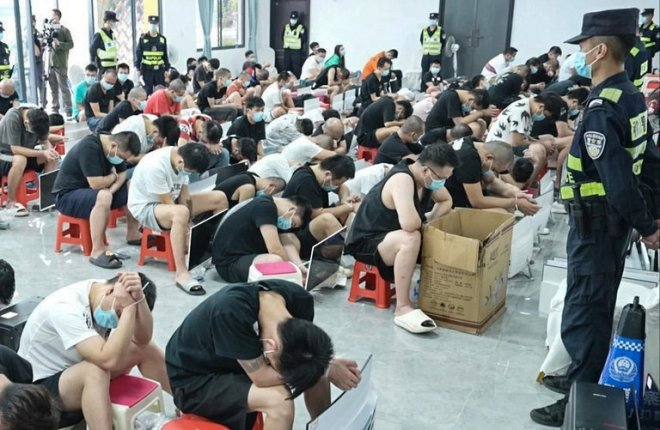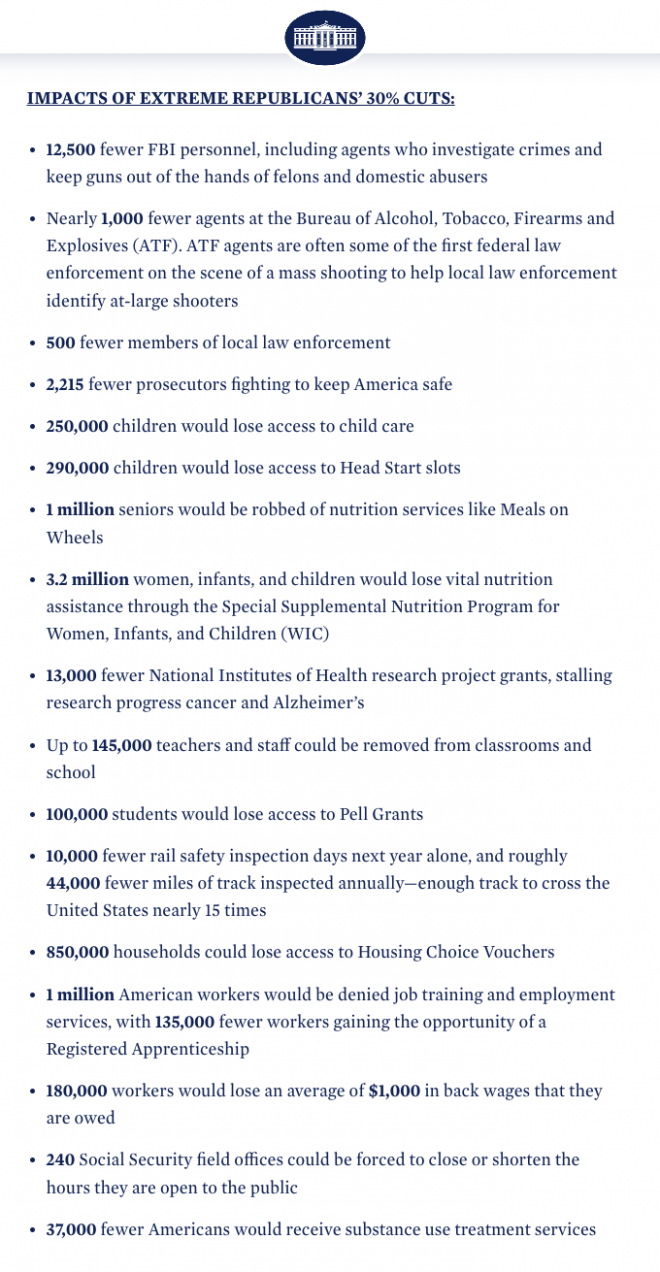Beijing asks rights group to withdraw award to jailed Hong Kong barrister
A South Korean human rights group has said it will stand by its decision to honor jailed Hong Kong rights activist and barrister Chow Hang-tung with the 2023 Gwangju Human Rights Award despite heavy political pressure from Beijing.A spokeswoman for the Seoul-based 5.18 Memorial Foundation said it had received a visit from three Chinese consular officials, who were hoping to persuade the organizers to withdraw the award, following its announcement on May 2.
“The Chinese government … thinks that Chow Hang-tung is one of the persons who has broken the law,” Bo Hyung Kim of the May 18 Foundation told Radio Free Asia. “They think that she is one of the criminals, not an activist who fights for democracy or human rights.”
Chow, who is currently serving time for “inciting” people to hold a vigil for the victims of the 1989 Tiananmen massacre, also stands accused of “incitement to subvert state power,” with the prosecution claiming that she and the Hong Kong Alliance in Support of Patriotic Democratic Movements of China used the now-banned vigils to incite the overthrow of the Chinese government.
Chow, who was announced as the winner of the 2023 Gwangju Prize for Human Rights on May 2, has refused to plead guilty in the hope of a more lenient sentence, saying that there is no case to answer.
“It felt strange, but we just welcomed their visit,” Kim said of the visit from the three officials. “We just had a very ordinary, normal meeting.”
The chairman of the foundation and the selection committee didn’t want the matter to escalate and become politicized, she said. So they let the officials speak and the foundation eventually rejected the request.
She said it hadn’t been possible to contact Chow, who was described in a foundation press release as “resisting the government of Hong Kong’s anti-democratic and anti-human rights treatment even while in detention, and ... giving courage and hope to human rights activists and citizens aspiring for a democratic society throughout the world.”
Kim said the lack of media freedom in Hong Kong made it hard to figure out why Chow was incommunicado. She said she thought at first that it would be possible to contact Chow Hang-tung.
“It’s hard to get to know about the situation in Hong Kong well,” she said. “But the reality is more than I expected.”
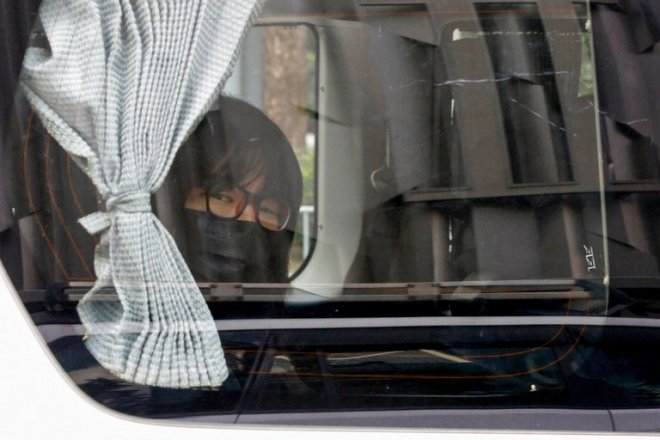 Chow Hang-tung is seen inside a vehicle after being detained in Hong Kong, Sept. 8, 2021. Credit: Reuters
Chow Hang-tung is seen inside a vehicle after being detained in Hong Kong, Sept. 8, 2021. Credit: Reuters‘A warning to the world’
Chow, who is awaiting trial under the national security law, warned the international community in December 2021 to take the crackdown on dissent in Hong Kong as a warning of spreading totalitarianism.
“Everything happening in Hong Kong is a warning to the world, showing the speed at which totalitarianism can destroy a free and open society, and repurpose the systems and laws originating from a democratic society as the tools of political suppression,” Chow said.
“Everything that has happened in Hong Kong could happen anywhere,” Chow said. “If you don’t want the rule of terror to spread like a pandemic, you must join the democratic resistance to totalitarianism.”
The Hong Kong government on Tuesday also took aim at a newspaper cartoon strip penned by prominent political cartoonist Zunzi, which satirized recent changes to electoral rules for the city’s District Council, which mean the government will directly appoint members of district anti-crime and fire protection committees, who are currently directly elected by local people.
“The Ming Pao today (May 9) published a cartoon strip by Zunzi that distorts and discredits the principle of appointment of members of the District Fight Crime Committee and District Fire Protection Committee by the Government,” the Home and Youth Affairs Bureau said in a statement on its Facebook page.
“Recently, the Ming Pao has made some misleading remarks about the government’s proposed plans for improving district governance ... a political act that tramples on ethics,” it said.
It said the new committee members would be appointed by the government “on the basis of meritocracy.”
Huang Jijun, 68, who has published work relating to the June 4, 1989 bloodshed under the pen-name Zunzi and had cartoons in every edition of the now-shuttered pro-democracy Apple Daily newspaper for 26 years, has previously said he plans to remain in Hong Kong despite a citywide crackdown on public dissent under a draconian national security law imposed by the ruling Chinese Communist Party from July 1, 2020.
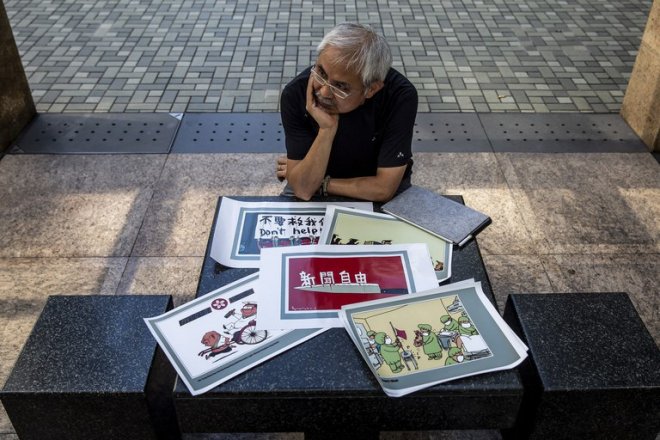 Political cartoonist Huang Jijun, 68, who goes by the pen-name Zunzi, is seen with some of his political cartoons in Hong Kong, June 20, 2020. Credit: AFP
Political cartoonist Huang Jijun, 68, who goes by the pen-name Zunzi, is seen with some of his political cartoons in Hong Kong, June 20, 2020. Credit: AFPHong Kong security czar Chris Tang hit out at Zunzi last month for taking aim at a police request for better surveillance equipment.
Zunzi has also taken aim at the Hong Kong government’s global talent recruitment drive, quipping that “priority will be given to applicants who are accepting of harsh governance, prompting the police force to write an angry letter to the Ming Pao, while a strip depicting political censorship was criticized by cultural officials as “wantonly smearing” the authorities.
Arrests and prosecution under the national security law have followed similar public denunciations by officials or Chinese Communist Party-backed media organizations in a number of past cases.
Proposed ban on ‘insults’ to flag and emblem
Meanwhile, authorities in Hong Kong are moving to ban “insults” to the city’s regional flag and emblem amid an ongoing clampdown on public criticism of the government, as officials denounced a cartoon strip satirizing recent changes to district-level election rules to ensure that only pro-China candidates can stand.
“The regional flag and regional emblem must be protected by the law and respected by the people,” the city’s Constitutional and Mainland Affairs Bureau said in a proposal sent to the legislature, which has been stacked with members willing to nod through government legislation since changes to the electoral system took effect last year.
It said the proposed changes to existing laws were aimed at “improving the safeguard of and promoting the proper use of the regional flag and regional emblem and
preserving their dignity, so that the public will ... express their love and support for the Hong Kong Special Administrative Region whilst showing respect for the regional flag and regional emblem.”
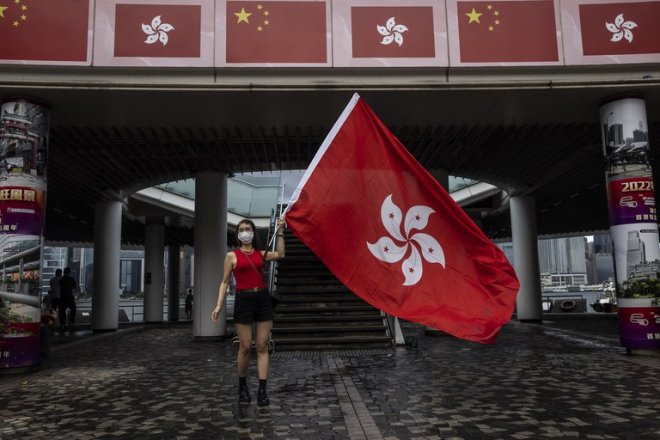 A woman holds the Hong Kong flag to celebrate the 25th anniversary of the city’s handover from Britain to China, in Hong Kong, July 1, 2022. Credit: AFP
A woman holds the Hong Kong flag to celebrate the 25th anniversary of the city’s handover from Britain to China, in Hong Kong, July 1, 2022. Credit: AFPThe move comes after Hong Kong passed a national anthem law in June 2020 banning “insults” to the Chinese national anthem after soccer fans in the city repeatedly booed, yelled Cantonese obscenities or turned their backs when it was played at matches.
Then, the government announced in December 2022 that the city’s organized crime and triad police would investigate the mistaken broadcast of the banned 2019 protest anthem “Glory to Hong Kong” at a number of recent overseas sporting events for possible breaches of a draconian national security law, which criminalizes speech and acts deemed to "incite hatred" of the authorities.
In October 2022, St Francis Xavier’s School suspended a number of students for three days for “committing disrespectful acts” in not showing up for the nationalistic ritual, which has been mandated in government-funded schools in Hong Kong since Jan. 1, 2022.
The proposed amendment will also ban any use of Hong Kong"s regional bauhinia flag and emblem that “undermines the dignity” of the items, as well as the use of faded or worn flags.
“Persons who take part in or attend a ceremony in which the regional flag is raised ... should stand solemnly facing the regional flag, look at the regional flag with respectful attention or salute the regional flag in an appropriate manner (as the case requires),” according to a document posted to the Legislative Council website.
It will also criminalize “burning, mutilating, scrawling on, defiling or trampling on” the emblem and flag or their images, and the flag can only be used at funerals with prior approval of the city’s chief executive, according to the proposed amendments.
Translated by Luisetta Mudie. Edited by Matt Reed.
[圖擷取自網路,如有疑問請私訊]
|
本篇 |
不想錯過? 請追蹤FB專頁! |
| 喜歡這篇嗎?快分享吧! |
相關文章
AsianNewsCast











